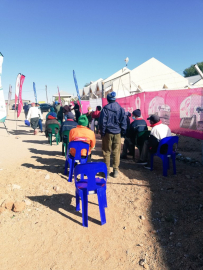
A report assessing social assistance programmes has revealed that the country’s social assistance system represents a major intervention by government in addressing deprivation amongst the country’s population.
According to the report titled ‘Social Assistance Programmes and Systems Review: South Africa’, South Africa’s social assistance system is an effective intervention for providing support to the poorest segments of the population.
Released by the Department of Social Development and the World Bank during a webinar held on Thursday, the report underscored the critical role of the grant and social assistance system in mitigating poverty. It also provided policy considerations that could help move South Africa’s system of social transfers towards sustainable and productive investments in its people.
The report found that the system is extensive, both in terms of the number of people it covers, directly and indirectly, and in terms of the amount of scarce resources it consumes.
It showed that approximately one in three South Africans is a direct beneficiary of a social grant, while nearly two-thirds of the population (64.0%) are either direct or indirect beneficiaries of the system.
According to official data, the number of grants paid out by government has increased from 12.02 million in 2006/07 to 17.81 million in 2018/19. Of these, child support grants are the vast majority (12.45 million children), followed by the older persons grant (3.55 million people), and the disability grant (1.05 million people).
“These three grants also dominate spending on grants. Of the total of R162.7 billion spent on grants in 2018/19, the older persons grant accounts for R70.6 billion; the child support grant for R60.6 billion, and the disability grant for R22.0 billion. Together, these three grants account for 94% of total spending on grants and nearly 96% of all grants,” the report highlighted.
Presenting the report, the World Bank Senior Economist, Victoria Monchuk, said South Africa spends more on social assistance than most other countries globally, accounting for 3.31% of Gross Domestic Product (GDP) and 15.4% of total government spending.
“This is fourth-highest in sub-Saharan Africa and 10thhighest globally, and is significantly higher than peers such as Argentina (2.1%), the Russian Federation (1.9%), Mexico (1.7%), India (1.5%), Brazil (1.4%) and China (0.8%).
“Despite fiscal constraints, social assistance spending has risen more rapidly than total government spending since 2000 (3.7% per annum versus 3.3%), and more rapidly than spending on education and health,” Monchuk said.
Limited support to working age adults and informal workers
The report also identified some of the system’s shortcomings, including limited support to working-age adults and informal workers, in particular; weak integration across programmes and government agencies, and the system’s limited ability to address household needs comprehensively.
“Social transfers are not fully integrated with other support services to help recipient households exit poverty,” the report said.
However, the report commended the important steps taken by the department to link social grants, especially Child Support Grant (CSG) beneficiaries, to a number of services, including student financial aid, to ensure accessibility to comprehensive packages of government programmes for the poor.
It further recognised government’s most recent COVID-19 response by extending the R350 Social Relief of Distress Grant to also protect caregivers of CSG beneficiary children, in addition to eligible working-age adults and informal workers.
Short-term reform options
To support households more comprehensively, the report recommended the continued strengthening of the integration of the social assistance system with services provided by departments, including Basic Education, Health, Public Works and Home Affairs.
It also recommended the development of an integrated social registry or an interoperable set of databases that can be used to more effectively identify vulnerable individuals and households, as well as coordinate the services they receive.
To support social grant beneficiaries to transition to jobs, the report suggested strengthening the quality and reach of the public and non-government employment service programmes and providing easier access for grant beneficiaries. It also suggested building out government’s new youth platform to better connect South Africa’s youth to job opportunities and provide more resources for jobseekers.
A story of large success
Practice Manager for Social Protection and Jobs in Southern and Eastern Africa at the World Bank, Paolo Belli, said the report presents a story of large success, and shows that the system of social grants plays a key role in poverty and inequality mitigation since the advent of democracy in South Africa.
“The social assistance system has created all the deliberate pillars to be able to be scaled up in case of crisis. What we’ve seen during the COVID-19 crisis is that South Africa has been able to mitigate the impact of economic recession in a much more effective away than most other countries in the region. These are all the strengthens that can be further harnessed in the future,” Belli said.
Social Development Deputy Director-General: Comprehensive Social Security, Brenda Sibeko, noted that more than half of South Africa’s population is trapped in a vicious circle of poverty and unemployment that is chronic, structural and widespread, and will not be solved by macroeconomic growth in the near future.
“The effects of COVID-19 must be mitigated immediately since they have the potential to severely exacerbate the existing economic and social problems in these times of global economic downturn,” Sibeko said. – SAnews.gov.za


